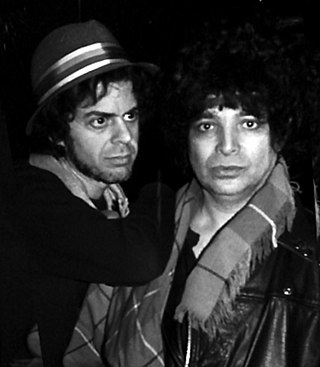
Suicide was an American musical duo composed of vocalist Alan Vega and instrumentalist Martin Rev, intermittently active between 1970 and 2016. The group's pioneering music used minimalist electronic instrumentation, including synthesizers and primitive drum machines, and their early performances were confrontational and often ended in violence. They were among the first acts to use the phrase "punk music" in an advertisement for a concert in 1970—during their very brief stint as a three-piece including Paul Liebegott.

Antipop is the sixth studio album by American rock band Primus. It was released on October 19, 1999, through Prawn Song Records and Interscope Records. Produced by the band, Tom Morello, Stewart Copeland, Tom Waits, Matt Stone, and Fred Durst, it was the final release by the band before their hiatus from 2000 to 2003. It was also the last album with drummer Brain. The album received mostly positive reviews from critics.

Boruch Alan Bermowitz, known professionally as Alan Vega, was an American vocalist and visual artist, primarily known for his work with the electronic protopunk duo Suicide.

Fighting is the fifth studio album by Irish rock band Thin Lizzy, released in 1975. Following the release of four studio albums, the band finally forged an identifiable sound featuring the twin guitars of Scott Gorham and Brian Robertson. This sound draws from hard rock, folk, pop and rhythm and blues. It set the stage for the big commercial breakthrough of the follow-up album, Jailbreak. The album was also their first album to chart in the UK, hitting No. 60.

Nightlife is the fourth studio album by Irish rock band Thin Lizzy, released on 8 November 1974 by Vertigo Records. It was produced by Ron Nevison and bandleader Phil Lynott, and was the first album to feature the band as a quartet with newcomers Scott Gorham and Brian Robertson on guitars.

River Runs Red is the debut studio album by American alternative metal band Life of Agony, released on October 12, 1993 by Roadrunner Records. It is a concept album, telling the story of a teenager, from a troubled household, who ultimately attempts suicide. The album features what Rolling Stone called "bleak odes to misanthropy, parental neglect, regret and killing yourself".

Suicide is the debut studio album from the American rock band Suicide. It was released in 1977 on Red Star Records and produced by Craig Leon and Marty Thau. The album was recorded in four days at Ultima Sound Studios in New York and featured Martin Rev's minimalist electronics and harsh, repetitive rhythms paired with Alan Vega's rock and roll-inspired vocals and depictions of urban life.

Suicide: Alan Vega and Martin Rev is the second studio album by the American band Suicide. It was produced by Ric Ocasek of the Cars for Ze Records in 1980. Recorded in January 1980, Ocasek gave keyboardist Martin Rev new equipment to perform on while Alan Vega distanced himself from the music to concentrate on the vocals. Michael Zilkha of Ze pushed to give the album a more dance music oriented sound, hoping that disco musician Giorgio Moroder would produce it.
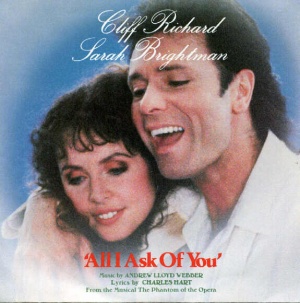
"All I Ask of You" is a song from the 1986 English musical The Phantom of the Opera, between characters Christine Daaé and Raoul, originally played on stage by Sarah Brightman and Steve Barton, respectively. It was written by Andrew Lloyd Webber, Charles Hart and Richard Stilgoe, and solely produced by Lloyd Webber. An operatic pop piece, its lyrics serve as dialogue between the two characters and discuss themes such as commitment and romance. Like Lloyd Webber's song "The Music of the Night", "All I Ask of You" was compared to the music found in Giacomo Puccini's 1910 opera La fanciulla del West.
"Frankie Teardrop" is a song by Suicide from the band's self-titled debut album, released in 1977.

Collision Drive is the second studio album by Alan Vega, released in 1981 by Celluloid Records.
"Ghost Rider" is a song by the protopunk band Suicide appearing on their debut album. The song is based on the Marvel Comics character.
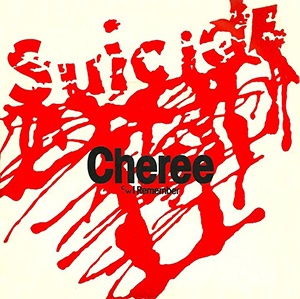
"Cheree" is a song by the synth punk band Suicide, written by its members Martin Rev and Alan Vega. It was released as a single in 1978 by Bronze Records. Since its initial release, it has been covered by a number of artists, most notably by? and the Mysterians on their 1999 album More Action.
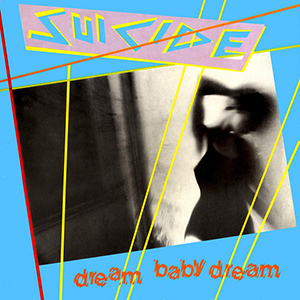
"Dream Baby Dream" is a song by the electro-punk band Suicide, written by its members Martin Rev and Alan Vega. It was released as a single in 1979 by Island Records. It has been covered by Neneh Cherry and The Thing on the 2011-recorded album The Cherry Thing and by Bruce Springsteen both live and in a studio version released on High Hopes (2014). Springsteen released a live version as an EP which was a part of the Alan Vega 70th Birthday Limited Edition EP Series in 2008. Also part of the EP series was a live version of "Dream Baby Dream" performed by Suicide on NBC's The Midnight Special in 1978.

Surrender is a single by the synthpop band Suicide, written by its members Martin Rev and Alan Vega. It was released as a single in 1988 by Chapter 22.

Half Alive is a compilation album by Suicide, originally released on cassette only on September 9, 1981 by ROIR. It is composed of live recordings from 1978 and home and studio demos recorded between 1974 and 1979.
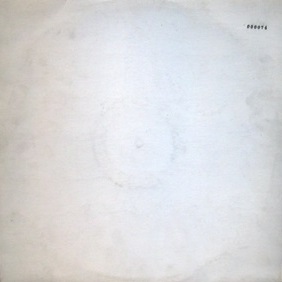
21½ Minutes in Berlin/23 Minutes in Brussels is a live performance album by Suicide, released in 1978 by Red Star Records. The B-side of the album is infamous for the audience's raucous revulsion toward the duo's performance, providing "some indication of the public's reaction to this confrontational duo in their heyday". 23 Minutes in Brussels remained largely unheard until its release in 1998 with the reissue of the band's self-titled debut album. 21½ Minutes in Berlin remains out of print.

Ghost Riders is a live performance album by Suicide, recorded in 1981 and released in 1986 by ROIR.
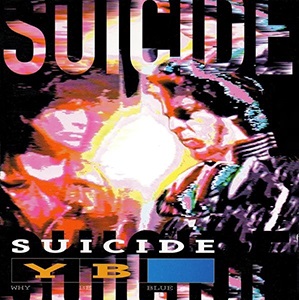
Why Be Blue is the fourth studio album by Suicide, originally released in 1992 by Brake Out Records. It was reissued on Mute Records Blast First sub-label in 2005 containing a new remix of the entire album by keyboardist Martin Rev, a revised track order, new artwork, plus an additional disc of live material from 1989.
















